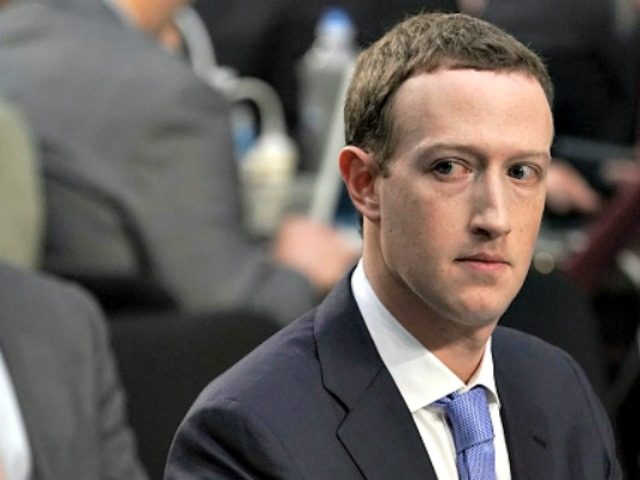Facebook chief executive Mark Zuckerberg claimed that Facebook would not exist without net neutrality. However, the company was founded before any net neutrality rules existed.
Sen. Roger Wicker (R-MS) asked Zuckerberg a question on Tuesday about privacy during a joint Senate Judiciary and Commerce Committee hearing on Facebook’s privacy Cambridge Analytica scandal.
Wicker asked whether he would support equalizing privacy protections between edge providers such as Facebook and Google and Internet service providers (ISPs) such as Comcast or Verizon.
Wicker said on Tuesday:
We don’t want go overregulating, so that we stifle innovation and investment.
I understand with suggested regulations there are basically two schools of thought: one where the ISPs, the internet service providers, who are advocating for consumer protections that apply to all online entities across the entire Internet ecosystem. Now, that Facebook is an edge provider on the other hand, and other edge providers may not support that effort because edge providers have different business models than the ISPs and should not be considered like services.
Do you think we need consistent privacy protections across for consumers the entire Internet ecosystem that are based upon based on private user information that are being collected, used, and shared regardless of the entity doing the collecting, using, and sharing?
Rep. Marsha Blackburn (R-TN), the chairman of the Communications and Technology subcommittee, sponsored the Browser Act, which would equalize the privacy protections between edge providers and ISPs. The Browser Act would require Internet service providers (ISPs) such as Comcast and Verizon as well as content providers such as Facebook, Google, and Twitter to obtain a user’s consent before collecting and selling their information for marketing.
“People are beginning to understand that you have a right to privacy when you go online. You have an expectation of privacy,” Blackburn argued in an exclusive interview with Breitbart News.
Zuckerberg responded to Wicker’s question, pivoting towards his support of net neutrality:
Senator this is an important question. ISPs, which I consider to be the pipes of the Internet, and the platforms like Facebook, and Google, or Twitter, or YouTube are the apps on top of that. I think in general the expectations that are expected of the pipes are different from the platforms so there might be areas where there needs to be more more regulation in one and less in the other. I think there are other places where there needs to be more in the other type.
…
I know net neutrality has been a hotly debated topic and one of the reasons that I have been out there saying that should be the case of my own story that when I was building Facebook at Harvard I only had one option for an ISP to use and if I had to pay extra in order to make it that my app could potentially be seen or used by other people then we wouldn’t probably be here today.
Zuckerberg argues that if he faced predatory ISP practices in college, he would not have been able to found his giant social media company. However, Zuckerberg founded Facebook in 2004, long before the Federal Communications Commission’s (FCC) Obama-era net neutrality order.
Net neutrality passed under former Chairman Tom Wheeler’s FCC in 2015. The rule, known as the Open Internet Order, reclassified the internet as a public monopoly. Critics chided the rule, stating that it would diminish the freedom of the internet. Proponents argue that the regulations prevent Internet service providers from discriminating against content providers. The FCC repealed the agency’s 2015 net neutrality order last December.
In fact, in the FCC’s “Restoring Internet Freedom Order,” which repealed the agency’s net neutrality order, restored the Federal Trade Commission’s (FTC) traditional authority and expertise to regulate and litigate unfair, deceptive, and anti-competitive telecommunications practices without onerous regulations and increased cost.
The FCC and the FTC agreed in December to share the responsibility to police ISP practices regarding unfair or deceptive practices to block, throttle, or promote web content.
Roslyn Layton, a visiting scholar at the American Enterprise Institute (AEI), told Breitbart News Saturday that “Google and Facebook have such an oligopoly” on advertising and that “we need to stop regulating Facebook’s competitors.” Layton contends that under Wheeler’s FCC, the Democrats have regulated ISPs to Facebook and Google’s benefit.
Former FCC commissioner Robert McDowell argued on Breitbart News Saturday that the issue of privacy relates to net neutrality, where he contends that edge providers such as Google and Facebook tried to force Internet service providers (ISPs) to adhere to a stricter set of privacy rule compared to themselves.
McDowell explained, “This all goes back to net neutrality, where edge providers tried to get Internet service providers, your cable company or your wireless company, to live by a stricter set of privacy standards than they lived under.”
“Net neutrality could be a fairness doctrine for the Internet,” McDowell said, contending that net neutrality could be used to stifle conservative and alternative speech.

COMMENTS
Please let us know if you're having issues with commenting.